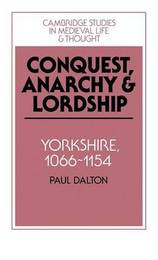
|
Conquest, Anarchy and Lordship: Yorkshire, 1066-1154
Hardback
Main Details
Description
Focusing on Yorkshire, by far the largest English county, this book examines three of the most important themes in the period described by Sir Frank Stenton as 'the first century of English feudalism': the Norman conquest, the anarchy of Stephen's reign, and the nature of lordship and land tenure. In each case the book offers a strong challenge to dominant interpretations which will alter significantly our conception of Anglo-Norman politics and government. The first section of the book reveals that the Norman conquest of Yorkshire was a much more rapid and carefully controlled process than has been supposed; the second section examines the 'anarchy' of King Stephen's reign and its consequences; and the final section deals with lordship, one of the most significant aspects of medieval society. Offering many revisionary arguments throughout, the book will become essential reading on both 'the first century' and 'the legal framework' of English feudalism.
Reviews"This is not only a very solid regional study but one that makes a number of important contributions to our understanding of English history as a whole in the Anglo-Norman period...Overall, this is a book that anyone interested in the history of England in the eleventh and twelfth centuries should read." Speculum-A Journal of Medieval Studies "Dalton's work is clear, shows well the complexities of lordship, and is valuable as the only full study of feudal Yorkshire...All in all, the book is provocative..." History "Paul Dalton's work on eleventh- and twelfth-century Yorkshire is far more than local history...must change our whole view of the politics of northern England, and of Anglo-Scottish relations, during the first half of the twelfth century...draws a vivid picture of the world of the Normans in Yorkshire." Emilie Amt, Albion "Dalton is good not only at reminding us of the shortcomings of the Domesday evidence, but also at showing how the silences of the great census may be explained in the context of his arguments." Emilie Amt, Albion
|